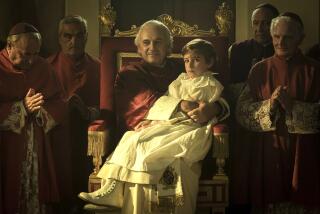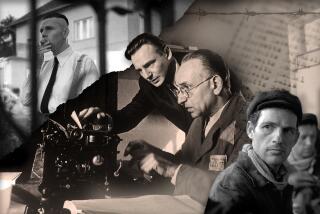Review: ‘The Book Thief’ robs the truth from an evil time
- Share via
“The Book Thief,” the handsome, inevitable adaptation of Markus Zusak’s internationally bestselling novel, unfolds as a curiosity on the big screen.
Centered on a war-afflicted girl who develops a passion for books, it features little discussion of the emotional pull of reading, storytelling or writing. It’s set in Hitler-run, World War II-era Germany with an odd emphasis on uplift over unease. And, most peculiarly, it’s a tale narrated by Death (a slithery-sounding Roger Allam) that wants tears shed for tragedies that befall its big-hearted non-Jewish German characters, but skirts explicitly addressing the fate of that generation’s Jews.
Perhaps this is all in the name of family-friendly, child’s-perspective entertainment. But what director Brian Percival and screenwriter Michael Petroni serve up is just another tasteful, staid Hollywoodization of terribleness, in which a catastrophic time acts as a convenient backdrop for a wishful narrative rather than the springboard for an honest one.
PHOTOS: Billion-dollar movie club
That our protagonist Liesel (Sophie Nélisse) is a product of hardship isn’t in question: The movie opens with her younger brother dying just before the illiterate, curly-haired 11-year-old is dropped off with her new foster parents — avuncular accordion-player Hans Hubermann (Geoffrey Rush, all winks and paternal smiles) and his stern-faced wife, Rosa (Emily Watson, severe until sweet). But over a series of vignettes in the fictional town of Molching that span from 1938 to the war’s end, Liesel remains a carefully manufactured, doe-eyed innocent for whom being good is obvious, even when she has to wear a Hitler Youth uniform.
The movie’s emotional thread is that acts of kindness can happen anywhere. (Especially if you don’t show or explain those other acts.) Hans teaches Liesel to read, and turns their basement walls into a dictionary canvas for learned words. At a nighttime book-burning led by the hate-spouting Burgomeister, Liesel snatches a charred tome from the fire after everyone has left.
The Burgomeister’s wife, her psyche softened by witnessing this, invites Liesel to peruse her enormous library. Later, Liesel pilfers books from them to read to an ailing young Jewish fugitive named Max (Ben Schnetzer), whom the Hubermanns begin hiding in their basement as repayment for Max’s father saving Hans’ life during the Great War. The chain of goodness continues when the blond neighbor boy Rudy (Nico Liersch) finds out about Max but doesn’t blab. In fact, he dives into a freezing river to retrieve one of Liesel’s prized possessions, a book that Max has given her.
The book is “Mein Kampf,” its text cheekily obliterated by Max with white paint. He’s implored Liesel to write her (presumably nicer) story over it. It’s the movie’s big metaphor — overpower bad words with good words — but a squishy one considering the book burning scene earlier. Isn’t there benefit to being educated about ugliness too?
Why is “The Book Thief” set in Nazi-occupied Germany, then, if it won’t engage with the era’s shattering momentousness?
As a showcase for accomplished performers tugging heart strings in a holiday awards season, it’s perfectly serviceable, like an episode of the crowd-pleasing “Downton Abbey,” which Percival also directs. But when Death claims in the epilogue to be “haunted by humans,” he’s clearly been watching something other than “The Book Thief.”
----------------------
‘The Book Thief’
MPAA rating: PG-13 for some violence and intense depiction of thematic material
Running time: 2 hours, 11 minutes
Playing: At the Landmark Theatre, West Los Angeles, and the ArcLight Hollywood
PHOTOS AND MORE
VIDEO: Upcoming fall films
ENVELOPE: The latest awards buzz
PHOTOS: Greatest box office flops
More to Read
Only good movies
Get the Indie Focus newsletter, Mark Olsen's weekly guide to the world of cinema.
You may occasionally receive promotional content from the Los Angeles Times.










